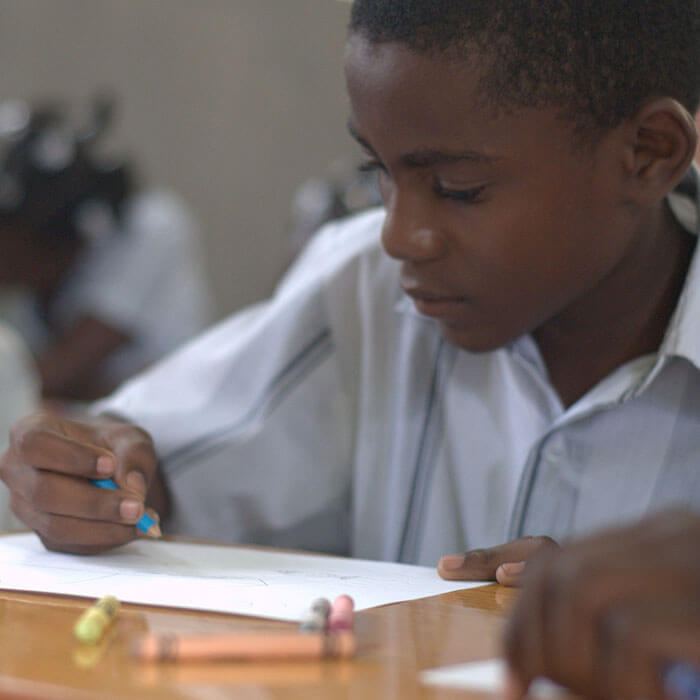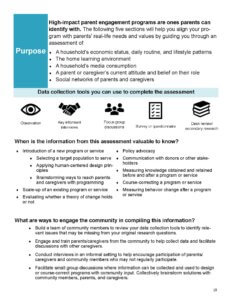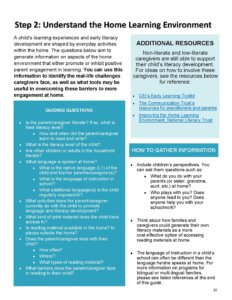Q&A: Piloting a new tool to get parents involved in their children’s learning
An interview with Helene Meinecke, Fabretto Children’s Foundation
[Editor’s Note: Over the past two years, Results for Development (R4D) has been working with Project Literacy to launch a global Community of Practice (COP). This diverse group of program implementers, researchers, and donors have pooled their collective knowledge and experience to co-develop five tools to support the work of literacy practitioners worldwide. This summer, R4D supported 13 literacy programs in eight countries to pilot test two of these tools. In this interview, Laurel Schmitt, a senior program associate at R4D, chats with Helene Meinecke, grants manager at Fabretto Children’s Foundation, to hear more about their experience piloting the Parent Engagement Needs Assessment — a tool to support literacy practitioners in promoting positive parent and caregiver engagement in children’s learning. The tool, which was inspired by the evidence base citing the importance of parent engagement in improving learning outcomes, will be refined based on feedback from the pilot tests and released publicly later this fall.]
Laurel: Helene, we’re excited to hear more about your experience piloting the Parent Engagement Needs Assessment. Before we dive in, can you tell us a little about Fabretto and the work you do with parents?
Helene: Fabretto Children’s Foundation is an NGO whose mission is to empower underserved Nicaraguan children and youth to reach their full potential through education. We focus on enhancing the quality of education, health and nutrition, hygiene, and the importance of literacy and promoting a love of reading. We do that by promoting a holistic approach to childhood development — relying not just on schools, but also engaging parents and the community through community education centers.
Laurel: Was there anything specific Fabretto was looking to learn from piloting the tool?
Helene: We’re always trying to keep our eyes open to what’s out there and new in the field – what other people are doing, how to not reinvent the wheel but try to learn and collaborate with others. We also want to make sure we have evidence that what we’re doing serves the community and meets its needs.
Fabretto has worked with parents for many years, but we’ve always been asking the question, “Should we be working more closely with parents? And are we focused enough on understanding their needs?” Being part of this pilot was a great opportunity for us to really focus on parent engagement and rethink our strategy.
And, especially since we work in some of the most vulnerable areas, we wanted to make sure families could participate and benefit from the programs we were delivering. We wanted to answer questions like: Do parents have enough time to participate? Do they understand the importance of engaging with their children to promote literacy?
While we do engage with parents, we haven’t taken a structured approach to designing those programs — it was more something that developed over time. We never had a structured tool and an organized list of questions. Therefore, we were interested in testing a more systematic approach to collecting information and seeing whether it could improve our programming. That’s why we were excited to learn about the new tool from the Project Literacy Community of Practice.
The Parent Engagement Needs Assessment guides literacy practitioners in understanding the unique constraints, attitudes, and needs of parents, allowing them to design more context-specific programs. The tool includes guiding questions, pro-tips, illustrative examples, and links to external resources to help practitioners assess the literacy context and caregiver experience.
Laurel: One thing we’ve heard from several organizations that piloted the tool was that it’s a good starting point but needs to be adapted to the local context. How did you adapt the tool?
Helene: We had the tool translated from English to Spanish. Once we translated it, our Education Coordinators had questions about how to support the field staff who would be implementing the tool. Those of us at headquarters sat down and discussed what we hoped to achieve with the tool — and how to communicate that to our field staff.
From these conversations, we developed some extra material explaining the theoretical background of the tool and why it’s important to engage with parents. For practicality purposes, we created worksheets with questions and space for responses.
Laurel: After the field staff had a better understanding of the process, how did they use the tool?
Helene: We started with parent training groups and reflection circles we already had in place. In several communities, for example, our field staff come together with parents every two weeks to discuss upcoming activities and share ideas on how to support children in their learning. We added the needs assessment as a special activity to these meetings. The field staff took notes during the interviews and focus group discussion and shared them with our team at headquarters.
Laurel: What did Fabretto think of the tool piloting process? How has it influenced your work?
Helene: Fabretto is a learning organization and using the tool made us structure our conversations in a way that allowed us to reflect on why we do the things we do. Just because we have done this work for so many years doesn’t mean it’s the only or best way to continue doing things.
We have our own community assessment tool that wasn’t always used. However, the pilot findings are being used to revise it, and it will definitely be used in the future. It opened our eyes to some of the things that we might not have considered — like making sure that, from the outset, you co-design programs with the people you’re going to be working with.
Laurel: I’d love to hear your thoughts on how other practitioners could implement this tool. What advice or recommendations would you give to another organization that wants to engage parents?
Helene: The first step is to explain the purpose and importance of the needs assessment to the people who will be conducting the interviews and focus groups with the parents.
Then it is essential to identify an entry point if parents are not already connected through the organization’s existing activities. Depending upon the context, it could be a local church, community group or through a school, where you already have parents meeting in a group setting. Once you find an entry point, it’s important to build trust with the parents before asking questions. Since the ultimate goal is to develop a parent engagement program, you must be transparent and clear with your intentions — parents need to know what you plan to do with the responses and information you collect.
Laurel: It sounds like framing is a really important part of the process. What did Fabretto learn about the parents or the communities you work with?
Helene: The big learning is that we need to consider perspectives from all parents, and we need to continually keep learning about the communities that we work in. We also found that nearly all of our respondents were mothers. Education seems to be handled by women, by the mothers. We had a difficult time engaging fathers.
Another specific learning is that those women don’t necessarily have access to all the information that can affect their children’s learning and education, such as household income, for example.
Laurel: Thank you so much, Helene. It’s been great to chat with you about Fabretto’s experiences and reflections from piloting the Parent Engagement Needs Assessment.
[Want to learn more? In the coming months, R4D and the Project Literacy COP will be sharing the tools and hosting webinars to introduce them – topics include parent engagement, measuring impact, communicating impact, adapting curricula to local contexts, and education technology. Sign up now to be the first to know when these resources are available online.]
















